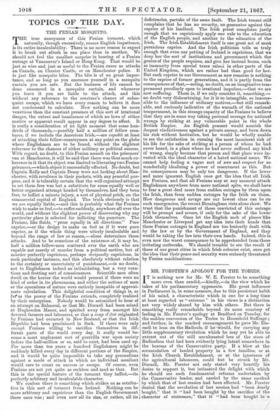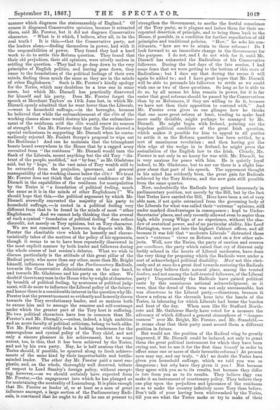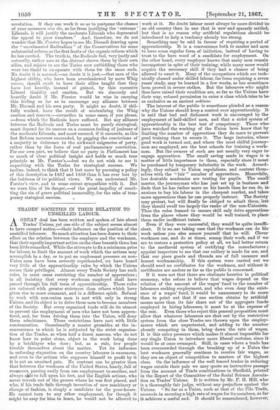MR. FORSTER'S APOLOGY FOR THE TORIES.
IT is nothing new for Mr. W. E. Forster to be something- more even than candid,—kindly,—in the view which he takes of his parliamentary opponents. His great influence in Parliament is, in some measure, due to this persistent habit. of his mind, a characteristic which in one for a long time at least regarded as " extreme " in his views is a distinction not very widely shared by him with others. But there is something really remarkable beyond its mere courtesy of feeling in Mr. Forster's apology at Bradford on Tuesday, for the sudden conversion of the Tories to Household Suffrage and further, in the marked encouragement he gave Mr. Dis- raeli to lean :tin the Radicals, if he gwould, for carrying any little supplementary `kvolution which he may yet be able to. extract out of the still unexhausted. lees of the store of Radicalism that had been evidently lying latent somewhere in the bosoms of the Conservative party. If a blow at the accumulation of landed property in a few families, or at the Irish Church Establishment, or at the ignorance of the agricultural labourers, could but be struck by Mr. Disraeli, Mr. Forster not only stated very heartily his desire to support it, but intimated the delight with which he should see such fundamental reforms undertaken by the Conservative leader, and carried by the same method by which that of last session had been effected. Mr. Forster denied that the revolution of last session had "been dearly bought," • that it " had been bought by the sacrifice of the character of statesmen," that it "had been bought in a manner which disgraces the statesmanship of England." Of course it disgraced Conservative opinions, because it retracted them, said Mr. Forster, but it did not disgrace Conservative character. " What is it which, I believe, after all, to be the real truth ? It is this,—that the Conservative party, not the leaders alone, finding themselves in power, had with it the responsibilities of power. They found they had a hard work to do to settle this Reform question. They found that their old prejudices, their old opinions, were utterly useless in settling the question. They had to go deep down to the very principles of English politics, and having gone down, they came to the foundations. of the political feelings of their own minds, finding them much the same as they are in the minds of other Englishmen." Such is Mr. Forster's kindly apology for the Tories, which may doubtless be a true one in some cases, but which Mr. Disraeli has practically disavowed for himself and his party. Does Mr. Forster forget the speech at Merchant Taylors' on 11th June last, in which Mr. Disraeli openly admitted that he went lower than the Liberals, —went to household suffrage,—in the boroughs, because lie believed that while the enfranchisement of the elite of the working classes alone would destroy his party, the enfranchise- ment of the residuum with the elite would renew its sources of strength ? Can Mr. Forster deny that the Tories showed a special enthusiasm in supporting Mr. Disraeli when he contu- meliously rejected Mr. Poulett Scrope's proposal to wipe out the Residuum ? And can he maintain that the triumphant boasts heard everywhere in the House that by a ragged army recruited from " the residuum " Mr. Disraeli would turn the flank of the Liberals, meant anything but the old Tory " dis• trust of the people, modified," not "by fear," as Mr. Gladstone said, but by " hope," in the vast mine of Tory wealth still to be extracted from the prejudice, ignorance, and general manageability of the working classes below the ate? We trust Mr. Forster does not think that the cynical confidence of Mr. Disraeli in the capabilities of the residuum for manipulation by the Tories is " a foundation of political feeling, much the same as it is in the minds of other Englishmen ?" We should hope that this,—the political argument by which Mr. Disraeli avowedly converted the majority of his party to household suffrage, — is rooted in a political feeling very different from that to be found in the minds of most " other Englishmen." And we cannot help thinking that the avowal of such a cynical " foundation of political feeling " does reflect discredit, not merely on Tory opinions, but on Tory character.
We are not concerned now, however, to dispute with Mr. Forster the charitable view which he honestly and charac- teristically takes of the motives of the policy of his opponents, though it seems to us to have been repeatedly disavowed in the most explicit manner by both leader and followers during the whole course of last session's debates. What we wish to discuss particularly is the attitude of this great pillar of the Radical party, who more than any other, more than Mr. Bright himself, influences the policy of the Parliamentary Radicals, towards the Conservative Administration on the one hand, and towards Mr. Gladstone and his party on the other. We .doubtif there is anyman in the House who by weight of character, by breadth of political feeling, by acuteness of political judg- ment, will do more to influence the Liberal policy of the future ; and hence there is a considerable interest in the question why Mr. Forster is at the present moment so evidently and honestly drawn towards the Tory revolutionary leader, and so anxious both to excuse him and to assuage the remorse and self-contempt ander which the greater part of the Tory host is suffering. No two political characters have less in common than Mr. Forster's and Mr. Disraeli's,—unless, indeed, a high ambition and an acute faculty of political criticism, belong to both alike. Yet Mr. Forster evidently feels a lurking tenderness for the =scrupulous and cynical policy of the Tory chief, and not only a sincere pleasure in his achievement, but to some extent, too, in this, that it has been achieved by the Tories, and not by his own party. Nay, he is half anxious that the Tories should, if possible, be spurred along to fresh achieve- ments of the same kind by their imperturbable and fertile- minded leader. The other day Mr. Forster paid a most em- phatic, and, on the whole, thoroughly well deserved, tribute of respect to Lord Stanley's foreign policy, without except- ing, however,—as we should certainly have expected from Mr. Forster,--the engagement into which he has plunged us for maintaining the neutrality of Luxemburg. It is plain enough that Mr. Forster as leader of, or at least as a man of great influence amongst, a large section of the Parliamentary Radi- cals, is .convinced that he ought to do all he can at present to strengthen the Government, to soothe the fretful conscience of the Tory party, as it plagues and lashes them for their un- repented desertion of principle, and to bring them back to the House, if possible, in a condition for further repudiation of old principles and traditional policies. "How," he asks his con- stituents, " how are we to attain to these reforms ? Do I look forward to an immediate change in the Government for the purpose. I do not, and I do not wish for it, until Mr. Disraeli has exhausted the Radicalism of his Conservative followers. During the last days of the late session, I had some fears that we were getting to the bottom of this store of Radicalism ; but I dare say that during the recess it will again be added to ; and I have great hopes that Mr. Disraeli will be able to persuade his followers to settle as we could wish one or two of these questions. So long as he is able to do so, by all means let him remain in power, for it is far easier that good reforms should be passed by the Conservatives than by us Reformers, if they are willing to do it, because we have not then their opposition to contend with." And Mr. Forster even gives us one glimpse how he thinks that one more great reform at least, tending to make land more easily divisible, might perhaps be managed by Mr. Disraeli. He might begin with Ireland, pointing out the hopeless political condition of the great Irish question, which makes it possible for him to appeal to all parties to settle it as the Reform question has been settled, by a sort of unanimous revolution ; and then having got the thin edge of the wedge in in Ireland, he might press the assimilation of the English law to the Irish. Clearly, Mr. Forster is not only in no hurry for war with Mr. Disraeli, he is very anxious for peace with him. He is quietly loyal indeed, to Mr. Gladstone, but to our ear there is a slight lan- guor about that part of his speech. The uppermost thought in his mind has evidently been, the great gain for Radicals achieved by the Tory Reform, and the new gain still possible from the same quarter.
Now, undoubtedly the Radicals have gained immensely in parliamentary position, not merely by the Bill, but by the fact that Tories have carried the Bill. Here have been a set of very able men, if not quite ostracized' from the governing body of the Liberals for what was called their "extreme" opinions, still under marked disadvantages in consequence ; kept to Under- Secretaries' places, and only recently allowed even to aspire thus high, while young Whigs of no experience, without the sha- dow of oratorical power, and of no particular ability, like Lord Hartington, were put into the highest Cabinet offices, and all because it was felt that "moderate Liberals " distrusted these men's " extreme " views on Reform and on a few other sub- jects. Well, now the Tories, the party of caution and reserve par excellence, the party which raised that cry of distrust only feebly echoed in the hearts of Liberal moderates, have done the very thing for proposing which the Radicals were under a sort of acknowledged political disability. Must not this obvi- ously and at once do a great deal towards restoring the Radicals to what they believe their natural place, among the trusted leaders, and not among the half-trusted followers, of the Liberal party I Unquestionably the Radicals have gained political caste by this unanimous national acknowledgment, as it were, that the dread of them was not only unreasonable, but was disastrous to the Liberal party,—disastrous, because it threw a reform at the eleventh hour into the hands of the Tories, in labouring for which Liberals had borne the burden and heat of the day. When men like Sir Stafford North- cote and Mr. Gathorne Hardy.have voted for a measure the advocacy of which diffused a general atmosphere of " danger- ousness over Mr. Bright, Mr. Forster, and Mr. Stansfeld,— it seems clear that their party must accord them a different position in future.
But would not the position of the Radical wing be greatly improved, if Mr. Disraeli could be induced, not only to grant them the great political instrument for which they have been crying out, but to use it for the first time himself in order to effect some one or more of their favourite reforms ? At present men may say, and say truly, " Ah ! no doubt the Tories have given you household suffrage, which we told you was so dangerous ; but why have they given it you ? Not because they agree with you as to its results, but because they differ in tote from you as to its results. They believe th,gy can make it an instrument of reactionary policy. They believe they can play upon the prejudices and ignorance of the residuum. so as to make the country infinitely more Tory than before. Don't talk of your having been whitewashed by the Tories, till you see what the Tories make or try to make of their revolution. If they can work it so as to postpone the chance of your measures sine die, so far from justifying the `extreme' Liberals, it will justify the moderate Liberals who deprecated the appeal to pure numbers." And, therefore, we do not wonder that Mr. Forster hopes to see Mr. Disraeli drawing upon the "unexhausted Radicalism " of the Conservatives for some substantial reform as the first fruits of the organic reform which he has carried. The truth is, the Radicals feel, very justly and naturally, rather sore at the distrust shown them by their own allies, and rejoice to see the Tories now outbidding those who were too timid to co-operate with them for the same ends. No doubt it is natural,—no doubt it is just,—that men of the highest ability, who have been overshadowed by mere Whig names, should exult to have their allies taught that they have lost heavily, instead of gained, by this excessive Liberal timidity and caution. But we sincerely and heartily doubt if Mr. Forster would be wise in carrying this feeling so far as to encourage any alliance between Mr. Disraeli and his own party. It might no doubt, if skil- fully worked, have the result of neutralizing the Whig caution and reserve-,—cowardice in some cases, if you please, —from which the Radicals have suffered. But any alliance between the Radicals and Tories must be purely strategical, must depend for its success on a common feeling of jealousy of the moderate Liberals, and must succeed, if it succeeds; as this last Reform measure succeeded, by gagging the convictions of a majority in deference to the awkward exigencies of party, rather than by the force of real parliamentary conviction. For our own part, we believe that no party in Parliament has- so much of clear political insight and holds so much true principle as Mr. Forster's,—but we do not wish to see it coquetting with the Tories for strategical success. We incline, indeed, to think that it lost more by pursuing a policy of this description in 1857 and 1858 than it has ever lost by the boldness of its political views. We can understand Mr. Forster's view, and to some extent sympathize with it. But we warn him of its danger,—of the great impolicy of remit- ting the sin of grave political immorality, for the sake of tem- porary stategical success.
































 Previous page
Previous page